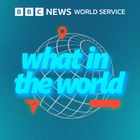
What in the World
Aug 23, 2024
This week we’ve had the release of what is, right now, the most popular game in the world - but it’s not a new version of GTA or Minecraft - this one is from China and it’s called Black Myth: Wukong. There are predictions it’s going to make hundreds of millions of dollars - and it now has more than two million active online players.
It’s been made by a relatively small Chinese company called Game Science and it’s the first time a game from the country has managed to break through internationally on this scale.
The BBC’s Kerry Allen, a China media analyst, describes the gaming industry in China - and the various restrictions gamers there face. And Mel Ramsay, a BBC journalist and video games expert explains why the game has become so popular inside and outside China - and some of the controversies around it.
Also, Kirk McKeand, a video games journalist in the UK who has played Black Myth: Wukong, gives us his take.
Instagram: @bbcwhatintheworld Email: [email protected] WhatsApp: +44 0330 12 33 22 6 Presenter: Hannah Gelbart Producers: Julia Ross-Roy, Emily Horler, Emilia Jansson and Alex Rhodes Editor: Verity Wilde

